Catti三级笔译(英译汉)
翻译资料 CATTI三级笔译汉译英真题
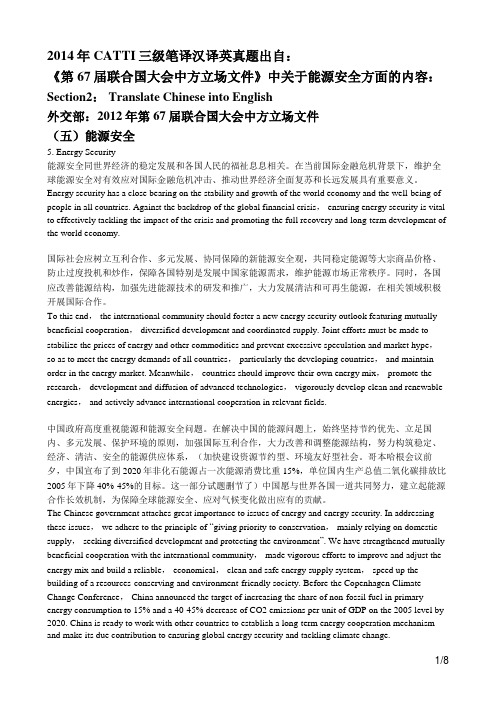
2014年CATTI三级笔译汉译英真题出自:《第67届联合国大会中方立场文件》中关于能源安全方面的内容:Section2:Translate Chinese into English外交部:2012年第67届联合国大会中方立场文件(五)能源安全5. Energy Security能源安全同世界经济的稳定发展和各国人民的福祉息息相关。
在当前国际金融危机背景下,维护全球能源安全对有效应对国际金融危机冲击、推动世界经济全面复苏和长远发展具有重要意义。
Energy security has a close bearing on the stability and growth of the world economy and the well-being of people in all countries. Against the backdrop of the global financial crisis,ensuring energy security is vital to effectively tackling the impact of the crisis and promoting the full recovery and long-term development of the world economy.国际社会应树立互利合作、多元发展、协同保障的新能源安全观,共同稳定能源等大宗商品价格、防止过度投机和炒作,保障各国特别是发展中国家能源需求,维护能源市场正常秩序。
同时,各国应改善能源结构,加强先进能源技术的研发和推广,大力发展清洁和可再生能源,在相关领域积极开展国际合作。
To this end,the international community should foster a new energy security outlook featuring mutually beneficial cooperation,diversified development and coordinated supply. Joint efforts must be made to stabilize the prices of energy and other commodities and prevent excessive speculation and market hype,so as to meet the energy demands of all countries,particularly the developing countries,and maintain order in the energy market. Meanwhile,countries should improve their own energy mix,promote the research,development and diffusion of advanced technologies,vigorously develop clean and renewable energies,and actively advance international cooperation in relevant fields.中国政府高度重视能源和能源安全问题。
三级笔译英译汉

三级笔译英译汉
摘要:
1.三级笔译英译汉的概述
2.三级笔译英译汉的考试内容
3.三级笔译英译汉的备考策略
4.三级笔译英译汉的发展前景
正文:
【三级笔译英译汉的概述】
三级笔译英译汉,是指在英语和汉语之间进行口译和笔译的能力测试,是中国大陆地区翻译专业资格(水平)考试的一个等级,主要面向从事英语翻译工作的人员。
该考试旨在检验考生的翻译实践能力,考核考生对英汉两种语言的语法、词汇、表达方式等方面的掌握程度,以及对翻译技巧的运用能力。
【三级笔译英译汉的考试内容】
三级笔译英译汉的考试内容主要包括两个部分:翻译实践和翻译理论。
翻译实践部分要求考生在规定时间内,根据所给的英文原文,完成汉译英和英译汉的笔译任务。
翻译理论部分主要考察考生对翻译基本原理、翻译方法和技巧的理解和掌握。
【三级笔译英译汉的备考策略】
1.提高英汉双语水平:要想在三级笔译英译汉考试中取得好成绩,首先需要提高自己的英汉双语水平。
这包括对英语语法、词汇的掌握,以及对汉语表达方式的熟悉。
2.学习翻译理论和技巧:掌握翻译基本原理、方法和技巧,有助于考生在实际翻译中更准确、地道地传达原文信息。
3.多做翻译实践:通过大量的翻译实践,考生可以积累经验,提高自己的翻译速度和质量。
4.参加培训课程:可以选择参加一些翻译培训课程,以系统地学习翻译知识和技巧。
【三级笔译英译汉的发展前景】
随着全球化的发展,英语作为国际交流的主要语言,其重要性日益凸显。
同时,中国国际地位的不断提高,使得英语和汉语之间的翻译需求越来越大。
catti2023年11月 三级笔译 英译汉

xxx,CATTI(我国外交部和全国翻译考试中心)举办了三级笔译英译汉考试,考试内容包括听力、笔译和译后编辑三个部分。
以下是本次考试的相关内容和要求:一、考试内容1. 听力部分:考生需要听一段英文录音,并在规定的时间内将其翻译成中文。
这一部分考察了考生的听力、理解能力以及翻译速度和准确度。
2. 笔译部分:考生需要在规定的时间内完成一篇英文文章的笔译工作。
这一部分考察了考生的翻译能力、语言表达能力以及对原文内容的理解和把握能力。
3. 译后编辑部分:考生需要对一篇已经翻译成中文的英文文章进行译后编辑,包括语法、用词、逻辑等方面的修正。
这一部分考察了考生的语言规范和文字处理能力。
二、考试要求1. 注重考生对英语听力和阅读能力的考察,以及对考生翻译能力的全面评估。
2. 评分标准包括翻译的准确性、流畅度、得体性,以及对原文的理解和把握程度。
3. 考试难度适中,要求考生具备一定的英语基础和翻译能力,能够熟练运用专业术语和技巧进行翻译。
三、备考建议1. 提前做好听力训练,培养自己对英语听力的敏感度和准确性。
2. 多读、多译,积累丰富的词汇和表达方式,提高翻译水平和速度。
3. 注重译文的逻辑性和连贯性,避免生搬硬套,注意上下文的衔接和语言的自然流畅。
四、总结本次CATTI三级笔译英译汉考试从听力、笔译和译后编辑三个方面全面考察了考生的英语水平和翻译能力,考试难度适中,要求考生具备一定的英语基础和翻译能力。
备考时考生需要注重对英语听力和阅读能力的提升,多做练习来提高自己的翻译水平。
希望考生能够认真备考,取得一个满意的成绩。
五、考试经验共享针对本次CATTI三级笔译英译汉考试,许多考生纷纷共享了自己的备考经验。
在听力部分,一些考生建议提前做好英语听力训练,可以选择一些专门的听力材料进行练习,培养对英语听力的敏感度和准确性。
平时多接触英文新闻、访谈节目等形式的英语听力素材,提高自己的听力水平,对于应对考试中的英文听力录音部分是非常有帮助的。
Catti三级笔译(英译汉)

A Part of Utah Built on Coal Wonders What Comes NextPRICE, Utah —For generations, coal has been the lifeblood of this mineral-rich stretch of eastern Utah. Mining families proudly recall all the years they toiled underground. Supply companies line the town streets. Above the road that winds toward the mines, a soot-smudged miner peers out from a billboard with the slogan “Coal = Jobs.”But recently, fear has settled in. The state’s oldest coal-fired power plant, tucked among the canyons near town, is set to close, a result of new, stricter federal pollution regulations.As energy companies tack away from coal, toward cleaner, cheaper natural gas, people here have grown increasingly afraid that their community may soon slip away. Dozens of workers at the facility here, the Carbon Power Plant, have learned that they must retire early or seek other jobs. Local trucking and equipment outfits are preparing to take business elsewhere.“There are a lot of people worried,” said Kyle Davis, who has been employed at the plant since he was 18.Mr. Davis, 56, worked his way up from sweeping floors to managing operations at the plant, whose furnaces have been burning since 1954.“I would have liked to be here for another five years,” he said. “I’m too young to retire.”But Rocky Mountain Power, the utility that operates the plant, has determined that it would be too expensive to retrofit the aging plant to meet new federal standards on mercury emissions. The plant is scheduled to be shut by April 2015.“We had been working for the better part of three years, testing compliance strategies,” said David Eskelsen, a spokesman for the utility. “None of the ones we investigated really would produce the results that would meet the requirements.”For the last several years, coal plants have been shutting down across the country, driven by tougher environmental regulations, flattening electricity demand and a move by utilities toward natural gas.This month, the board of directors of the Tennessee Valley Authority, the country’s largest public power utility, voted to shut eight coal-powered plants in Alabama and Kentucky and partly replace them with gas-fired power. Since 2010, more than 150 coal plants have been closed or scheduled for retirement.The Environmental Protection Agency estimates that the stricter emissions regulations for the plants will result in billions of dollars in related health savings, and will have a sweeping impact on air quality.In recent weeks, the agency held 11 “listening sessions” around the country in advance of proposing additional rules for carbon dioxide emissions.“Co al plants are the single largest source of dangerous carbon pollution in the United States, and we have ready alternatives like wind and solar to replace them,” said Bruce Nilles,director of the Sierra Club’s Beyond Coal campaign, which wants to shut all of the nation’s coal plants.“We have a choice,” he said, “which in most cases is cheaper and doesn’t have any of the pollution.”Coal’s downward turn has hit Appalachia hardest, but the effects of the transition toward other energy sources has started to ripple westward.Mr. Eskelsen said Rocky Mountain Power would place some of the 70 Carbon facility employees at its two other Utah coal plants. Other workers will take early retirement or look for different jobs.Still, the notion that this pocket of Utah, where Greek, Italian and Mexican immigrants came to mine coal more than a century ago, could survive without it, is hard for people here to comprehend.“The attack on coal is so broad-reaching in our little community,” said Casey Hopes, a Carbon County co mmissioner, whose grandfather was a coal miner. “The power plants, the mines —they support so many smaller businesses. We don’t have another industry.”Like others in Price, Mr. Hopes voiced frustration with the Obama administration, saying it should be investing more in clean coal technology rather than discarding coal altogether. Annual Utah coal production, though, has been slowly declining for a decade according to the federal Energy Information Administration.Last year, mines here produced about 17 million tons of coal, the lowest level since 1987, though production has crept up this year.“This is the worst we’ve seen it,” said David Palacios, who works for a trucking company that hauls coal to the power plants, and whose business will slow once the Carbon plant closes. Mr. Palacios, president of the Southeastern Utah Energy Producers Association, noted that the demand for coal has always ebbed and flowed here.“But this has been two to three years we’re struggling through,” he said.Compounding the problem, according to some mining experts, is that until now, most of the state’s coal has been sold and used within the region, rather than being exported overseas. That has left the industry here more vulnerable to local plant closings.Cindy Crane, chairwoman of the Utah Mining Association, said demand for Utah coal could eventually drop as much as 50 percent. “For most players in Utah coal, this a tough time,” said Ms. Crane, vice president of PacifiCorp, a Western utility and mining company that owns the Carbon plant.Mr. Nilles of the Sierra Club acknowledged that the shift from coal would not be easy on communities like Carbon County. But employees could be retrained or compensated for lost jobs, he said, and new industries could be drawn to the region.Washington State, for example, has worked with municipalities and utilities to ease the transition from coal plants while ensuring that workers are transferred to other energy jobs or paid, if nearing retirement, Mr. Nilles said.“Coal has been good to Utah,” Mr. Nilles said, “but markets for coal are drying up. Y ou need to get ahead of this and make sure the jobs don’t all leave.”For many here, coal jobs are all they know. The industry united the area during hard times, too, especially during the dark days after nine men died in a 2007 mining accident some 35 miles down the highway. Virtually everyone around Price knew the men, six of whom remain entombed in the mountainside.But there is quiet acknowledgment that Carbon County will have to change —if not now, soon.David Palacios’s father, Pete, who worked in the mines for 43 years, has seen coal roar and fade here. Now 86, his eyes grew cloudy as he recalled his first mining job. He was 12, and earned $1 a day.“I’m retired, so I’ll be fine. But these young guys?” Pete Palacios said, his voice trailing off.NARSAQ, Greenland —As icebergs in the Kayak Harbor pop andhiss while melting away, this remote Arctic town and its culture are alsodisappearing in a changing climate.Narsaq’s largest employer, a shrimpfactory, closed a few years ago after the crustaceans fled north to coolerwater. Where once there were eight commercial fishing vessels, there is nowone.As a result, the population here,one of southern Greenland’s major towns, has been halved to 1,500 in just adecade. Suicides are up.“Fishing is the heart of this town,”said Hans Kaspersen, 63, a fisherman. “Lots of people have lost theirlivelihoods.”But even as warming temperatures areupending traditional Greenlandic life, they are also offering up intriguing newopportunities for this state of 57,000 — perhaps nowhere more so than here inNarsaq.V ast new deposits of minerals andgems are being discovered as Greenland’s massive ice cap recedes, forming thebasis of a potentially lucrative mining industry.One of the world’s largest depositsof rare earth metals —essential for manufacturing cellphones, wind turbinesand electric cars — sits just outside Narsaq.It has long been known thatGreenland sat upon vast mineral lodes, and the Danish government has mappedthem intermittently for decades. Niels Bohr, Denmark’s Nobel Prize-winningnuclear physicist and a member of the Manhattan Project, visited Narsaq in 1957because of its uranium deposits.But previous attempts at miningmostly failed, proving too expensive in the inclement conditions. Now, warminghas altered the equation.Greenland’s Bureau of Minerals andPetroleum, charged with managing the boom, currently has 150 active licensesfor mineral exploration, up from 20 a decade ago. Altogether, companies spent$100 million exploring Greenland’s deposits last year, and several are applyingfor licenses to begin construction on new mines, bearing gold, iron and zincand rare earths. There are also foreign companies exploring for offshore oil.The Black Angel lead and zinc mine,which closed in 1990, is applying to reopen this year, said Jorgen T.Hammeken-Holm, who oversees licensing at the country’s mining bureau, “becausethe ice is in retreat and you’re getting much more to explore.”The Greenlandic government hopesthat mining will provide new revenue. In granting Greenland home rule in 2009,Denmark froze its annual subsidy, which is scheduled to be decreased further inthe coming years.Here in Narsaq, a collection ofbrightly painted homes bordered by spectacular fjords, two foreign companiesare applying to the government for permission to mine.That proximity promises employment,and the company is already schooling some young men in drilling and in English,the international language of mine operations. It plans to build a processingplant, a new port and more roads. (Greenland currently has none outside ofsettledareas.) Narsaq’s tiny airport, previously threatened with closure fromlack of traffic, could be expanded. A local landlord is contemplatingconverting an abandoned apartment block into a hotel.“There will be a lot of peoplecoming from outside and that will be a big challenge since Greenlandic culturehas been isolated,” said Jasper Schroder, a student home in Narsaq fromuniversity in Denmark.Still, he supports the mine andhopes it will provide jobs and stem the rash of suicides, particularly amonghis peers; Greenland has one of the highest suicide rates in the world. “Peoplein this culture don’t want to be a burden to their families if they can’tcontribute,” he said.But not all are convinced of thebenefits of mining. “Of course the mine will help the local economy and willhelp Greenland, but I’m not so sure if it will be good for us,” said Dorotheaodg aard, who runs a local guesthouse. “We are worried about the loss ofnature.”It didn’t take long for Manuel García Murillo, a bricklayer who took over as mayor here last June, to realize that his town was in trouble. It was 800,000 euros, a little more than $1 million, in the red. There was no cash on hand to pay for anything — and there was work that needed to be done.But then an amazing thing happened, he said. Just as the health department was about to close down the day care center because it didn’t have a proper kitchen, Bernardo Benítez, a construction worker, offered to put up the walls and the tiles free. Then, Maria José Carmona, an adult education teacher, stepped in to clean the place up.And somehow, the volunteers just kept coming. Every Sunday now, the residents of this town in southwest Spain —young and old — do what needs to be done, whether it is cleaning the streets, raking the leaves, unclogging culverts or planting trees in the park.“It was an initiative from them,” said Mr. García. “Day to day we talked to people and we told them there was no money. Of course, they could see it. The grass in between the sidewalks was up to my thigh. “Higuera de la Serena is in many ways a microcosm of Spain’s troubles. Just as Spain’s national and regional governments are struggling with the collapse of the construction industry, overspending on huge capital projects and a pileup of unpaid bills, the same problems afflict many of its small towns.But what has brought Higuera de la Serena a measure of fame in Spain is that the residents have stepped up where their government has failed. Mr. García says his phone rings regularly from other town officials who want to know how to do the same thing. He is serving without pay, as are the town’s two other elected officials. They are also forgoing the cars and phones that usually come with the job.“We lived beyond our means,” Mr. García said. “We invested in public works that weren’t sensible. We are in technical bankruptcy.” Even some money from the European Union that was supposed to be used for routine operating expenses and last until 2013 has already been spent, he said.Higuera de la Serena, a cluster of about 900 houses surrounded by farmland, and traditionally dependent on pig farming and olives, got swept up in the giddy days of the construction boom. It built a cultural center and invested in a small nursing home. But the projects were plagued by delays and cost overruns.The cultural center still has no bathrooms. The nursing home, a whitewashed building sits on the edge of town, still unopened. Together, they account for some $470,000 of debt owed to the bank. But the rest of the debt is mostly the unpaid bills of a town that was not keeping up with its expenses. It owes for medical supplies, for diesel fuel, for road repair, for electrical work, for musicians who played during holidays.Higuera de la Serena is not completely without workers. It still has a half-time librarian, two half-time street cleaners, someone part-time for the sports complex, a secretary and an administrator, all of whom are paid through various financing streams apart from the town. But the town once had a work force twice the size. And when someone is ill, volunteers haveto step in or the gym and sports complex — open four hours a day — must close.For more than 30 years, I have been wondering about L.R. Generson.On one of our first Christmases together, my husband gave me a complete set of Dickens. There were 20 volumes, bound in gray cloth with black corners, old but in good condition. Stamped on the flyleaf of each volume, in faded block letters, was the name of the previous owner: "L.R. Generson, M.D., Bronx, NY."That Dickens set is one of the best presents anyone has ever given me. A couple of the books are still pristine, but others - “Bleak House,’’ “David Copperfield,’’ and especially “Great Expectations’’ - have been read and re-read almost to pieces. Over the years, the character kept me company. And so, , has L.R. Generson.,in his silent enigmatic way.Did he love the books as much as I do? Who was he? On a whim, I Googled him. There wasn’t much - a single mention on a veterans’ website of a World War II captain named Leonard Generson. But I did find a Dr. Richard Generson, an oral surgeon living in New Jersey. Since Generson is not a common name, I decided to write to him.Dr. Generson was kind enough to write back. He told me that his father, Leonard Richard Generson, was born in 1909. He lived in New Y ork City but went to medical school in Basel, Switzerland. He spoke 10 languages fluently. As an obstetrician and gynecologist, he opened a practice in the Bronx shortly before World War II. His son described him as “an extremely patriotic individual’’; right after Pearl Harbor he closed his practice and enlisted. He served throughout the war as a general surgeon with an airborne special forces unit in Europe, where he became one of the war’s most highly decorated physicians.Leonard Generson’s son didn’t remember the Dickens set, though he told me that there were always a lot of novels in the house. His mother probably “cleaned house’’ after his father’s death in 1977 - the same year my husband bought the set in a used book store.I found this letter very moving, with its brief portrait of an intelligent, brave man and his life of service. At the same time, it made me question my presumption that somehow L.R. Generson and I were connected because we’d owned the same set of books. The letter both told me a little about him, and told me that I would never really know anything about him - and why should I? His son must have been startled to hear from a stranger on such a fragile pretext. What had I been thinking?One possible, and only somewhat facetious, answer is that I’ve read too much Dickens. In the world of a Dickens novel, everything is connected to everything else. Orphans find families. Lovers are joined (or parted and morally strengthened). Ancient mysteries are solved and old scores are settled. Questions are answered. Stories end.Leonard Generson’s life touched mine only lightly, th rough the coincidence of a set of books. But there are other lives he touched more deeply. The next time I read a Dickens novel, I will think of him and his military service and his 10 languages. And I will think of the hundreds of babies he must have delivered, who are now in the middle of their own lives and their own stories.格陵兰岛纳萨克——随着皮艇港(Kayak Harbor)的冰山在融化过程中发出嘶嘶的响声,这座偏远的北极小镇和它的文化,也正在随着气候变化而消失。
2024英语三级笔译(Catti 3)实务真题及参考译文

2024年英语三级笔译(CATTI3)实务真题及参考译文1.英译汉(原文)The last vestiges of Covid Restrictions have finally been removed, and international tourism is exploding—more than 900 million eager tourists took to the skies in 2022, doubling the number from 2021.But as world travel recovers from the pandemic, the rise in tourism is, among other things, overwhelming foreign infrastructure, disrupting local residents and diminishing the overall tourist experience.Although tourism still boosts the economies of hotspot cities, municipal authorities are concerned about the impact over tourism has on their communities and cultural heritage sites and have thus started taking matters into their own hands to mitigate overcrowding.To counter the downsides of overtourism, the travel industry can utilize tech-based tools that combat the root causes of tourist congestion and actively encourage travel to lesser-known places, thereby satisfying tourists without burdening the local residents.According to one study, when tourist numbers exceed a city’s carrying capacity, residents’ perception of their home as a good place to live begins to deteriorate, increasing feelings of resentment toward tourists during peak seasons.Amsterdam, with its picturesque canals, stunning brick architecture and leisurely bicycle paths, is just one of several cities reeling from the effects of overtourism; more than 20 million tourists are anticipated to visit the city this year alone.To curb the flow of visitors without destabilizing the tourism market, the city introduced a cap on overnight guests and is proposing further measures that include relocating some popular tourist attractions to outside the city center—or even removing them altogether.To give the city more “breathing space”, the mayor of Dubrovnik(杜布罗夫尼克,克罗地亚城市)shut down 80% of its souvenir stalls and restricted cruise ship and tour bus operations. City officials in Barcelona instituted taxes for overnight tourists and barred entry to certain food markets. And in Venice, officials banned the development of new hotels and installed turnstiles along popular routes to redirect tourist traffic.To thrive with resident communities, the tourism industry must cultivate a new approach that better serves local interests when promoting destinations and trip options.Marketing trips through the use of thoughtful ad campaigns and tech tools that inspire tourists to venture away from conventional hotspots and explore lesser-known attractions could lead to a more even distribution of travelers across various destinations.To that end, dispersing tourists should be a top business goal for travel providers rather than focusing only on the high-traffic destinations. This not only enables travelers to genuinely experience diverse cultures but also provides vital support torural-located businesses, restaurants and cultural establishments, which stand to gain the most from tourist dollars.In order to empower travelers to visit new or unfamiliar destinations, the industry should consider leveraging tech-based tools to convince them. Airbnb(爱彼迎公司), for example, rolled out flexible search features in 2021 that divert bookings away from destinations at times when overtourism occurs, encouraging tourists to make accommodations in alternative cities or towns.With tourists overrunning major destinations, the tourism industry and local municipalities must find some middle ground. Heavily visited cities will otherwise be forced to impose further tourist restrictions, putting an entire revenue stream at risk.1.英译汉(译文)新冠疫情最后剩余的限制终于被解除,国际旅游业也因此迎来了爆发式增长——2022年,有超过9亿热切的游客乘飞机出行,人数是2021年的两倍。
catti三级笔译题型

catti三级笔译题型CATTI(中国高级翻译资格考试)是中国翻译界的权威认证考试,分为笔译和口译两个级别。
在笔译方面,CATTI考试分为一级、二级和三级。
下面我将从多个角度全面地介绍CATTI三级笔译的题型。
CATTI三级笔译考试主要包括以下几个题型:1. 英译汉,这是CATTI三级笔译考试的主要题型之一。
考生需要将一篇英文文章准确、流畅地翻译成汉语。
这种题型考察考生对英语语法、词汇、表达方式以及翻译技巧的掌握程度。
2. 汉译英,这种题型要求考生将一篇汉语文章准确、通顺地翻译成英语。
考生需要具备良好的英语语法、词汇、表达能力以及翻译技巧。
3. 汉译汉,这种题型要求考生将一篇汉语文章进行改写或者润色。
考生需要对汉语表达有较高的敏感度和驾驭能力,能够准确地把握文章的风格、语气和表达方式。
4. 英译英,这种题型要求考生将一篇英语文章进行改写或者润色。
考生需要具备良好的英语表达能力和对英语语境的理解,能够准确地传达原文的意思,并提高文章的流畅度和可读性。
除了以上几个主要的题型,CATTI三级笔译考试还可能涉及到以下一些题型:5. 衔接翻译,考生需要将若干个句子或段落进行衔接翻译,保持句子和段落之间的连贯性和一致性。
6. 辞章翻译,考生需要将一个完整的辞章进行翻译,包括标题、导语、正文和结尾等部分。
7. 文化补充,考生需要在翻译中对文化背景进行适当的补充,以确保译文的准确性和通顺性。
8. 语言转换,考生需要将一种特定领域的语言转换为另一种特定领域的语言,例如将法律文本转化为商务文本。
总体而言,CATTI三级笔译考试的题型涵盖了不同领域、不同文体和不同语种的翻译要求,考察考生的翻译能力、语言功底、文化素养以及应对复杂翻译任务的能力。
考生需要具备广泛的知识储备、良好的语言表达能力和翻译技巧,才能在考试中取得好成绩。
2020年下半年英语三级笔译(CATTI 3) 实务考试真题及参考译文
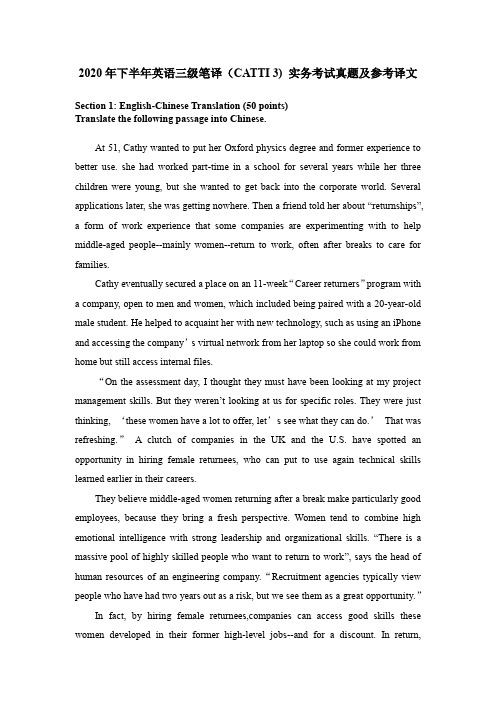
2020年下半年英语三级笔译(CATTI 3) 实务考试真题及参考译文Section 1: English-Chinese Translation (50 points)Translate the following passage into Chinese.At 51, Cathy wanted to put her Oxford physics degree and former experience to better use. she had worked part-time in a school for several years while her three children were young, but she wanted to get back into the corporate world. Several applications later, she was getting nowhere. Then a friend told her about “returnships”, a form of work experience that some companies are experimenting with to help middle-aged people--mainly women--return to work, often after breaks to care for families.Cathy eventually secured a place on an 11-week“Career returners”program with a company, open to men and women, which included being paired with a 20-year-old male student. He helped to acquaint her with new technology, such as using an iPhone and accessing the company’s virtual network from her laptop so she could work from home but still access internal files.“On the assessment day, I thought they must have been looking at my project management skills. But they weren’t looking at us for specific roles. They were just thinking, ‘these women have a lot to offer, let’s see what they can do.’That was refreshing.” A clutch of companies in the UK and the U.S. have spotted an opportunity in hiring female returnees, who can put to use again technical skills learned earlier in their careers.They believe middle-aged women returning after a break make particularly good employees, because they bring a fresh perspective. Women tend to combine high emotional intelligence with strong leadership and organizational skills. “There is a massive pool of highly skilled people who want to return to work”, says the head of human resources of an engineering company.“Recruitment agencies typically view people who have had two years out as a risk, but we see them as a great opportunity.”In fact, by hiring female returnees,companies can access good skills these women developed in their former high-level jobs--and for a discount. In return,employers coach these middle-aged females back into working life. Through her returnship, Cathy gained a full-time role as an operations data consultant. She still is earning less than she would like to, “but it’s a foot in the door and the salary is up for review in six months,”she says. It is still overwhelmingly women who stay home to care for young children. UK government figures show that women account for around 90 percent of people on career breaks for caring reasons. A lack of middle-aged women working, particularly in high skilled roles, is costing the UK economy £50 billion a year, according to a report. The report found that men over 50 took home nearly two-thirds of the total wages paid out to everyone in that age range in 2015. It blamed the pay gap on the low-skilled, part-time roles middle-aged women often accept. Some 40 percent of women in work in the UK do so part-time, as opposed to only 11 percent of men. This issue is not restricted to the UK. A study last year by economists found “strong evidence of age discrimination in hiring against older women”in a range of white- and blue-collar jobs. The data show that it is harder for middle-aged women to find jobs than it is for middle-aged men, regardless of whether they have taken a break from working.【参考译文】:51岁的凯茜希望更好地利用她的牛津大学物理学学位以及先前的工作经验。
catti三级笔译的题型

CATTI三级笔译的题型1. 任务概述CATTI(中国高级翻译资格考试)是中国翻译界的权威考试之一,分为三个级别:三级、二级和一级。
CATTI三级笔译考试是其中的一项考试内容,主要测试考生的翻译能力和语言运用能力。
本文将详细介绍CATTI三级笔译的题型、要求和备考建议。
2. 题型概述CATTI三级笔译考试共包含三个部分:汉译英、英译汉和中译中。
每个部分都有不同的题型,考察不同的翻译技巧和能力。
2.1 汉译英汉译英部分主要考察考生将中文材料准确、流畅地翻译成英文的能力。
题型包括:•句子翻译:要求考生根据给定的中文句子,翻译成符合英文表达习惯的句子。
这类题目主要考察考生的语法和词汇运用能力。
•段落翻译:要求考生根据给定的中文段落,翻译成连贯、准确的英文段落。
这类题目主要考察考生的逻辑思维和语言组织能力。
•篇章翻译:要求考生根据给定的中文篇章,翻译成流畅、准确的英文篇章。
这类题目主要考察考生的整体翻译质量和语言表达能力。
2.2 英译汉英译汉部分主要考察考生将英文材料准确、流畅地翻译成中文的能力。
题型包括:•句子翻译:要求考生根据给定的英文句子,翻译成符合中文表达习惯的句子。
这类题目主要考察考生的语法和词汇运用能力。
•段落翻译:要求考生根据给定的英文段落,翻译成连贯、准确的中文段落。
这类题目主要考察考生的逻辑思维和语言组织能力。
•篇章翻译:要求考生根据给定的英文篇章,翻译成流畅、准确的中文篇章。
这类题目主要考察考生的整体翻译质量和语言表达能力。
2.3 中译中中译中部分主要考察考生将一种语言的材料翻译成另一种语言的能力。
题型包括:•句子翻译:要求考生根据给定的中文句子,翻译成另一种语言的句子。
这类题目主要考察考生对两种语言的翻译技巧和语言运用能力。
•段落翻译:要求考生根据给定的中文段落,翻译成另一种语言的段落。
这类题目主要考察考生的逻辑思维和语言组织能力。
•篇章翻译:要求考生根据给定的中文篇章,翻译成另一种语言的篇章。
CATTI三级笔译考试经典复习资料

1. 英译汉Just as Darwin discovered the law of development of organic nature so Marx discovered the law of development of human history, the simple fact , hitherto concealed by an overgrowth of ideology, that mankind must first of all eat, drink, have shelter and clothing before it can pursue politics, science, art, religion, etc; that, therefore the production of the immediate material means of subsistence and consequently the degree of economic development attained by a given people during a given epoch form the foundation upon which the state institutions, the legal conceptions, art, and even the ideas on religion, of the people concerned have been evolved, and in the light of which they must, therefore, be explained, instead of vice versa, as had hitherto been the case.英译汉:正如达尔文发现有机自然界的发展规律一样,马克思发现了人类历史的发展规律,即历来繁茂芜杂的意识形态所掩盖着的一个简单事实:人们首先要吃、要喝、要穿、要住,然后才能从事政治、科学、艺术、宗教等等;所以,生产直接与生活有关部门的物质用品,会为一个民族或一个时代带来一定的经济发展,这两者又构成了国家制度、法律观念、艺术以及宗教思想的基础。
上半年catti三级笔译真题(汉译英)

互联网在中国改革开放中的重要作用怎么说都不为过。
从2000年开始,中国互联网应用的普及,到现在快20年的时间。
尤其是在最后的这15年,互联网为保持高速发展起到了决定性的作用。
经济发展有两个东西是至关重要的:第一就是提高生产效率,提升产品质量,生产出更有创意的设计;第二就是保持渠畅通,使工厂生产的东西以最快的速度、最低的成本送到消费者的手里。
互联网在这两个环节都为中国的产业发展起到了决定性的作用。
【参考译文】The importance of the Internet in China’s reform and opening up cannot be overstated. The year of 2000 marks the beginning of nearly two decades’ popularity the Internet has enjoyed in China. Especially over the last 15 years, the Internet has played a decisive role in sustaining rapid development of the country. Economic development is enabled, crucially, by two factors: first, the improvement of production efficiency with higher product quality and more creative designs, and second, open channels through which factory products can be delivered to customers at the fastest speed and lowest cost.That is how the Internet decisively accounts for China’s industrial development.互联网的发展在设计理念和设计人才方面极大的缩小了我们与国际先进的国家的差距。
CATTI三级笔译实务(附答案)
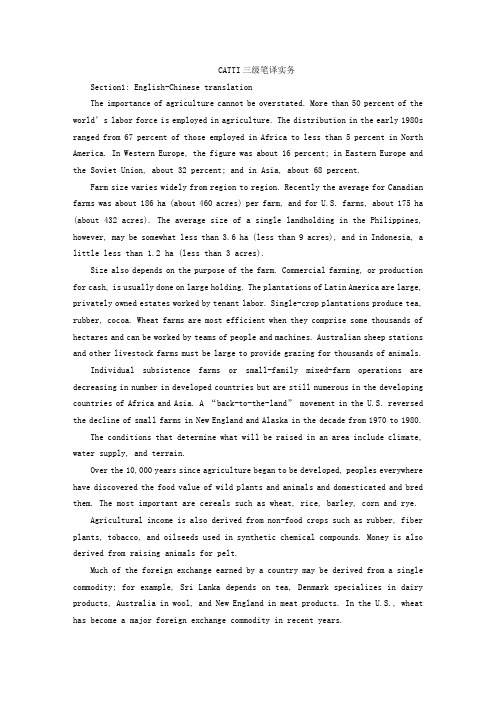
CATTI三级笔译实务Section1: English-Chinese translationThe importance of agriculture cannot be overstated. More than 50 percent of the world’s labor force is employed in agriculture. The distribution in the early 1980s ranged from 67 percent of those employed in Africa to less than 5 percent in North America. In Western Europe, the figure was about 16 percent; in Eastern Europe and the Soviet Union, about 32 percent; and in Asia, about 68 percent.Farm size varies widely from region to region. Recently the average for Canadian farms was about 186 ha (about 460 acres) per farm, and for U.S. farms, about 175 ha (about 432 acres). The average size of a single landholding in the Philippines, however, may be somewhat less than 3.6 ha (less than 9 acres), and in Indonesia, a little less than 1.2 ha (less than 3 acres).Size also depends on the purpose of the farm. Commercial farming, or production for cash, is usually done on large holding. The plantations of Latin America are large, privately owned estates worked by tenant labor. Single-crop plantations produce tea, rubber, cocoa. Wheat farms are most efficient when they comprise some thousands of hectares and can be worked by teams of people and machines. Australian sheep stations and other livestock farms must be large to provide grazing for thousands of animals.Individual subsistence farms or small-family mixed-farm operations are decreasing in number in developed countries but are still numerous in the developing countries of Africa and Asia. A “back-to-the-land” movement in the U.S. reversed the decline of small farms in New England and Alaska in the decade from 1970 to 1980.The conditions that determine what will be raised in an area include climate, water supply, and terrain.Over the 10,000 years since agriculture began to be developed, peoples everywhere have discovered the food value of wild plants and animals and domesticated and bred them. The most important are cereals such as wheat, rice, barley, corn and rye.Agricultural income is also derived from non-food crops such as rubber, fiber plants, tobacco, and oilseeds used in synthetic chemical compounds. Money is also derived from raising animals for pelt.Much of the foreign exchange earned by a country may be derived from a single commodity; for example, Sri Lanka depends on tea, Denmark specializes in dairy products, Australia in wool, and New England in meat products. In the U.S., wheat has become a major foreign exchange commodity in recent years.The importance of an individual country as an exporter of agricultural products depends on many variables. Among them is the possibility that the county is too little developed industrially to produce manufactured goods in sufficient quantity or technical sophistication. Such agricultural exporters include Ghana with cocoa, and Myanmar with rice. On the other hand, an exceptionally well-developed country may produce surpluses not needed by its own population; this as been true of the U.S., Canada, and some of the West European countries.Section2: Chinese-English translation由于西藏地处“世界屋脊”,自然条件恶劣,也由于几百年落后的封建农奴制社会形成的各种社会历史条件内的限制,西藏在全国还属于不发达地区。
catti三级考试内容
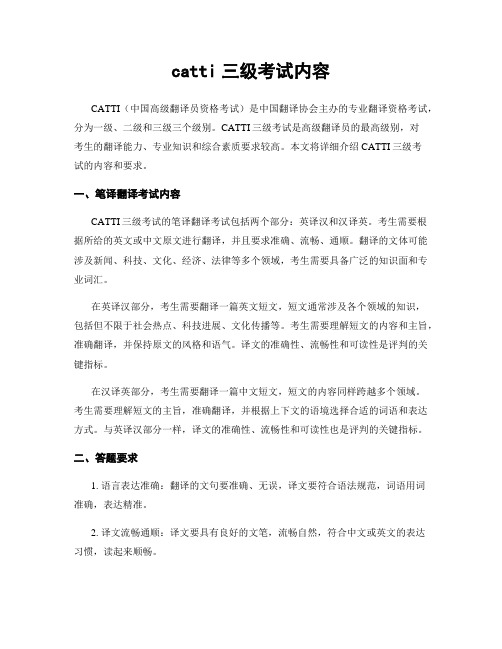
catti三级考试内容CATTI(中国高级翻译员资格考试)是中国翻译协会主办的专业翻译资格考试,分为一级、二级和三级三个级别。
CATTI三级考试是高级翻译员的最高级别,对考生的翻译能力、专业知识和综合素质要求较高。
本文将详细介绍CATTI三级考试的内容和要求。
一、笔译翻译考试内容CATTI三级考试的笔译翻译考试包括两个部分:英译汉和汉译英。
考生需要根据所给的英文或中文原文进行翻译,并且要求准确、流畅、通顺。
翻译的文体可能涉及新闻、科技、文化、经济、法律等多个领域,考生需要具备广泛的知识面和专业词汇。
在英译汉部分,考生需要翻译一篇英文短文,短文通常涉及各个领域的知识,包括但不限于社会热点、科技进展、文化传播等。
考生需要理解短文的内容和主旨,准确翻译,并保持原文的风格和语气。
译文的准确性、流畅性和可读性是评判的关键指标。
在汉译英部分,考生需要翻译一篇中文短文,短文的内容同样跨越多个领域。
考生需要理解短文的主旨,准确翻译,并根据上下文的语境选择合适的词语和表达方式。
与英译汉部分一样,译文的准确性、流畅性和可读性也是评判的关键指标。
二、答题要求1. 语言表达准确:翻译的文句要准确、无误,译文要符合语法规范,词语用词准确,表达精准。
2. 译文流畅通顺:译文要具有良好的文笔,流畅自然,符合中文或英文的表达习惯,读起来顺畅。
3. 译文语言地道:译文要具有地道的语言风格,符合原文的语气和文体,尽量避免生硬翻译和译文的生硬感。
4. 译文语义准确:译文的语义要准确传达原文的意思,不能有歧义或误导读者的情况。
5. 考察专业知识:考生需要具备广泛的知识面,熟悉多个领域的专业词汇和术语,能够准确理解和翻译相关的领域内容。
6. 注意时态和语态:翻译时需要注意原文的时态和语态,译文要准确地反映原文的时态和语态。
三、备考建议1. 提前准备:备考CATTI三级考试需要提前准备,积累大量的词汇和专业知识,熟悉各个领域的词汇和表达方式。
2019年上半年CATTI三级笔译真题(英译汉)

Both WHO’s constitution and the Universal Declaration of Human Right assert that health is a human right, not a privilege for those who can afford it. Over time, that right has made its way into both national and international law. But importantly, the right to health is not simply a noble idea on a piece of paper.【参考译文】世界卫生组织《组织法》与《世界人权宣言》(Universal Declaration of Human Right)均强调健康是一项人权,而不是那些有经济实力者享有的特权。
随着时间的推移,健康权已逐渐载入各国法律和国际法律。
但重要的是,健康权绝非只是纸上空谈。
It has been a platform for major improvements in global health. Since 1948, life expectancy has increased by 25 years. Maternal and childhood mortality have plummeted. Smallpox has been eradicated and polio is on the brink. We have turned the tide on the HIV/AIDS epidemic. Deaths from malaria have dropped dramatically. New vaccines have made once-feared diseases easily preventable. And there are many other causes for celebration. But even as we continue to struggle with old threats, new ones have arisen. Climate change will have profound effects on health. Antimicrobial resistance has the potential to undo the gains of modern medicine. Vaccine hesitancy is putting millions of young lives at risk. Noncommunicable diseases, including heart disease, stroke, cancer diabetes, hypertension, lung diseases and mental illnesses have become the major killers of our time. And of course, we continue to face theever-present threat of outbreaks and other health emergencies.【参考译文】健康权一直是全球健康状况得以获得重大改善的平台。
2022年上半年英语三级笔译(CATTI 3) 实务考试真题及参考译文
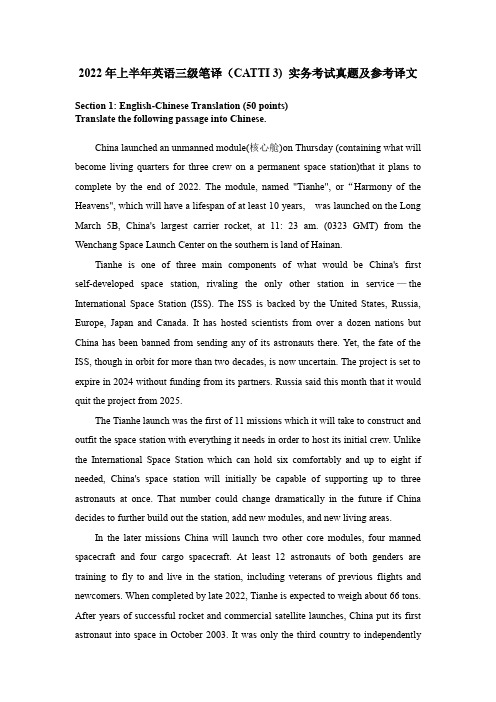
2022年上半年英语三级笔译(CATTI 3) 实务考试真题及参考译文Section 1: English-Chinese Translation (50 points)Translate the following passage into Chinese.China launched an unmanned module(核心舱)on Thursday (containing what will become living quarters for three crew on a permanent space station)that it plans to complete by the end of 2022. The module, named "Tianhe", or“Harmony of the Heavens", which will have a lifespan of at least 10 years, was launched on the Long March 5B, China's largest carrier rocket, at 11: 23 am. (0323 GMT) from the Wenchang Space Launch Center on the southern is land of Hainan.Tianhe is one of three main components of what would be China's first self-developed space station, rivaling the only other station in service—the International Space Station (ISS). The ISS is backed by the United States, Russia, Europe, Japan and Canada. It has hosted scientists from over a dozen nations but China has been banned from sending any of its astronauts there. Yet, the fate of the ISS, though in orbit for more than two decades, is now uncertain. The project is set to expire in 2024 without funding from its partners. Russia said this month that it would quit the project from 2025.The Tianhe launch was the first of 11 missions which it will take to construct and outfit the space station with everything it needs in order to host its initial crew. Unlike the International Space Station which can hold six comfortably and up to eight if needed, China's space station will initially be capable of supporting up to three astronauts at once. That number could change dramatically in the future if China decides to further build out the station, add new modules, and new living areas.In the later missions China will launch two other core modules, four manned spacecraft and four cargo spacecraft. At least 12 astronauts of both genders are training to fly to and live in the station, including veterans of previous flights and newcomers. When completed by late 2022, Tianhe is expected to weigh about 66 tons. After years of successful rocket and commercial satellite launches, China put its first astronaut into space in October 2003. It was only the third country to independentlydo so after the former Soviet Union and the United States.Since that Shenzhou-5 mission, China has sent other astronauts into orbit, placed crews on the original Tiangong Station and conducted a space walk. The launch of as pace lab Tiangong-1in 2011 and Tiangong-2 in2016 helped China test the program's space rendezvous and docking capabilities.China plans another mission in 2024 to bring back lunar samples and to land people on the moon and possibly build a scientific base there. No timeline has been proposed for such projects. China aims to become a major space power by 2030. It has ramped its space program with visits to the moon, the launch of an uncrewed probe to Mars and the construction of its own space station. The Chinese space agency has been moving fast in its aim to catch up to the U. S. and Russia in the new space race.【参考译文】:中国计划于2022年底建成一个永久性太空站/空间站。
CATTI三级笔译参考译文

Part 1 English-Chinese TranslationPassage 1如果你从未见过一座发电厂,你可能很难想象发电设备是多么复杂,锅炉能产生多么巨大的热量,而炉子每天又是需要烧多少煤。
举例说,我们的一座发电厂——摩根顿发电厂——的各台锅炉一天中就能把二千四百万加仑的水化为蒸汽。
这座电厂的炉子一天之内就消耗九千九百吨煤。
波多马克电力公司(PEPCO)用煤量如此巨大,以致我们专门购置了两列八十节车皮的火车以加速输送煤的过程。
仅仅一座摩根顿电厂就能每天生产二千五百万千瓦小时的电。
电是靠使大型磁铁在发电机内的线圈里面转动而产生的。
磁铁转速愈高,产生的电压就愈高。
电流从波多马克电力公司的发电机出来时,其电压在13,800伏至24,000伏之间。
下一道程序是使电流通过一个变压器,把电压提升,并使电继续向前进。
一根导线就象一根小口径的水管。
把电压升高就象给水加压一样,这样一来就会使这个系统中能量的运动加快。
Passage 2由于飞机制造工业需要越来越多的铝板,已设计了新的设备把制造铝板的工序自动化。
这套设备包括一个巨型的热处理炉,一架可以起吊热的金属板而不至于损坏它们的吊车和一套能控制整个工艺流程的计算机系统。
五年前,欧洲的飞机制造工业每年只需要8,000吨铝板。
去年这个数字增加到21,800吨。
到2004年它将达到30,000吨。
每架民航飞机就含有180吨铝板。
因此正在对这套设备进行改建,以便提高产品的质量和产量。
铝与其他金属一起被制成合金,铸成锭子,并且把锭子的表面光洁化。
预热之后,锭子在一架可以容纳3.75米宽的平板的轧机中进行轧制。
这套新设备可使这个工序提高效率,并能改进产品的质量。
举例说,铝板加热的温度,铝板通过轧机的速度,以及用水对它进行冷却的速度等等,都由计算机控制。
由于工序全部自动化和使用计算机控制,这套新设备能够处理两倍于被它代替的旧设备的产量。
Part 2 Chinese-English TranslationI address these words in favor of the cultivation of the imagination.In what sense, then, do I use th6 word "imagination"? The meaning of "imagination" is "the power of forming ideal pictures"; "the power of representing absent things to ourselves and to others."That is the sense in which I shall use the word "imagination" in the course of my address.Now follow out this thought and I think I can make my meaning clear. Absent things! Take history. History deals with the things of the past. They are absent in a sense, from your minds -- that is to say you cannot see them; but the study of history qualifies you and strengthens your capacity for understanding things that are not present to you, and thus I wish to recommend history to you as a most desirable course of study.Section 1 英译汉(60分)按照法律规定,在英格兰、苏格兰和威尔士,家长一定要使自己的孩子在5岁至16岁期间在学校或其它地方接受全日制教育,在北爱尔兰则为4岁至16岁。
- 1、下载文档前请自行甄别文档内容的完整性,平台不提供额外的编辑、内容补充、找答案等附加服务。
- 2、"仅部分预览"的文档,不可在线预览部分如存在完整性等问题,可反馈申请退款(可完整预览的文档不适用该条件!)。
- 3、如文档侵犯您的权益,请联系客服反馈,我们会尽快为您处理(人工客服工作时间:9:00-18:30)。
A Part of Utah Built on Coal Wonders What Comes NextPRICE, Utah — For generations, coal has been the lifeblood of this mineral-rich stretch of eastern Utah. Mining families proudly recall all the years they toiled underground. Supply companies line the town streets. Above the road that winds toward the mines, a soot-smudged miner peers out from a billboard with the slogan “Coal = Jobs.”But recently, fear has settled in. The state’s oldest coal-fired power plant, tucked among the canyons near town, is set to close, a result of new, stricter federal pollution regulations.As energy companies tack away from coal, toward cleaner, cheaper natural gas, people here have grown increasingly afraid that their community may soon slip away. Dozens of workers at the facility here, the Carbon Power Plant, have learned that they must retire early or seek other jobs. Local trucking and equipment outfits are preparing to take business elsewhere.“There are a lot of people worried,” said Kyle Davis, who has been employed at the plant since he was 18.Mr. Davis, 56, worked his way up from sweeping floors to managing operations at the plant, whose furnaces have been burning since 1954.“I would have liked to be here for another five years,” he said. “I’m too young to retire.”But Rocky Mountain Power, the utility that operates the plant, has determined that it would be too expensive to retrofit the aging plant to meet new federal standards on mercury emissions. The plant is scheduled to be shut by April 2015.“We had been working for the better part of three years, testing compliance strategies,” said David Eskelsen, a spokesman for the utility. “None of the ones we investigated really would produce the results that would meet the requirements.”For the last several years, coal plants have been shutting down across the country, driven by tougher environmental regulations, flattening electricity demand and a move by utilities toward natural gas.This month, the board of directors of the Tennessee Valley Authority, the country’s largest public power utility, voted to shut eight coal-powered plants in Alabama and Kentucky and partly replace them with gas-fired power. Since 2010, more than 150 coal plants have been closed or scheduled for retirement.The Environmental Protection Agency estimates that the stricter emissions regulations for the plants will result in billions of dollars in related health savings, and will have a sweeping impact on air quality.In recent weeks, the agency held 11 “listening sessions” around the country in advance of proposing additional rules for carbon dioxide emissions.“Co al plants are the single largest source of dangerous carbon pollution in the United States, and we have ready alternatives like wind and solar to replace them,” said Bruce Nilles,director of the Sierra Club’s Beyond Coal campaign, which wants to shut all of the nation’s coal plants.“We have a choice,” he said, “which in most cases is cheaper and doesn’t have any of the pollution.”Coal’s downward turn has hit Appalachia hardest, but the effects of the transition toward other energy sources has started to ripple westward.Mr. Eskelsen said Rocky Mountain Power would place some of the 70 Carbon facility employees at its two other Utah coal plants. Other workers will take early retirement or look for different jobs.Still, the notion that this pocket of Utah, where Greek, Italian and Mexican immigrants came to mine coal more than a century ago, could survive without it, is hard for people here to comprehend.“The attack on coal is so broad-reaching in our little community,” said Casey Hopes, a Carbon County co mmissioner, whose grandfather was a coal miner. “The power plants, the mines —they support so many smaller businesses. We don’t have another industry.”Like others in Price, Mr. Hopes voiced frustration with the Obama administration, saying it should be investing more in clean coal technology rather than discarding coal altogether. Annual Utah coal production, though, has been slowly declining for a decade according to the federal Energy Information Administration.Last year, mines here produced about 17 million tons of coal, the lowest level since 1987, though production has crept up this year.“This is the worst we’ve seen it,” said David Palacios, who works for a trucking company that hauls coal to the power plants, and whose business will slow once the Carbon plant closes. Mr. Palacios, president of the Southeastern Utah Energy Producers Association, noted that the demand for coal has always ebbed and flowed here.“But this has been two to three years we’re struggling through,” he said.Compounding the problem, according to some mining experts, is that until now, most of the state’s coal has been sold and used within the region, rather than being exported overseas. That has left the industry here more vulnerable to local plant closings.Cindy Crane, chairwoman of the Utah Mining Association, said demand for Utah coal could eventually drop as much as 50 percent. “For most players in Utah coal, this a tough time,” said Ms. Crane, vice president of PacifiCorp, a Western utility and mining company that owns the Carbon plant.Mr. Nilles of the Sierra Club acknowledged that the shift from coal would not be easy on communities like Carbon County. But employees could be retrained or compensated for lost jobs, he said, and new industries could be drawn to the region.Washington State, for example, has worked with municipalities and utilities to ease the transition from coal plants while ensuring that workers are transferred to other energy jobs or paid, if nearing retirement, Mr. Nilles said.“Coal has been good to Utah,” Mr. Nilles said, “but markets for coal are drying up. You need to get ahead of this and make sure the jobs don’t all leave.”For many here, coal jobs are all they know. The industry united the area during hard times, too, especially during the dark days after nine men died in a 2007 mining accident some 35 miles down the highway. Virtually everyone around Price knew the men, six of whom remain entombed in the mountainside.But there is quiet acknowledgment that Carbon County will have to change — if not now, soon.David Palacios’s father, Pete, who worked in the mines for 43 years, has seen coal roar and fade here. Now 86, his eyes grew cloudy as he recalled his first mining job. He was 12, and earned $1 a day.“I’m retired, so I’ll be fine. But these young guys?” Pete Palacios said, his voice trailing off.NARSAQ, Greenland — As icebergs in the Kayak Harbor pop andhiss while melting away, this remote Arctic town and its culture are alsodisappearing in a changing climate.Narsaq’s largest employer, a shrimpfactory, closed a few years ago after the crustaceans fled north to coolerwater. Where once there were eight commercial fishing vessels, there is nowone.As a result, the population here,one of southern Greenland’s major towns, has been halved to 1,500 in just adecade. Suicides are up.“Fishing is the heart of this town,”said Hans Kaspersen, 63, a fisherman. “Lots of people have lost theirlivelihoods.”But even as warming temperatures areupending traditional Greenlandic life, they are also offering up intriguing newopportunities for this state of 57,000 — perhaps nowhere more so than here inNarsaq.Vast new deposits of minerals andgems are being discovered as Greenland’s massive ice cap recedes, forming thebasis of a potentially lucrative mining industry.One of the world’s largest depositsof rare earth metals —essential for manufacturing cellphones, wind turbinesand electric cars — sits just outside Narsaq.It has long been known thatGreenland sat upon vast mineral lodes, and the Danish government has mappedthem intermittently for decades. Niels Bohr, Denmark’s Nobel Prize-winningnuclear physicist and a member of the Manhattan Project, visited Narsaq in 1957because of its uranium deposits.But previous attempts at miningmostly failed, proving too expensive in the inclement conditions. Now, warminghas altered the equation.Greenland’s Bureau of Minerals andPetroleum, charged with managing the boom, currently has 150 active licensesfor mineral exploration, up from 20 a decade ago. Altogether, companies spent$100 million exploring Greenland’s deposits last year, and several are applyingfor licenses to begin construction on new mines, bearing gold, iron and zincand rare earths. There are also foreign companies exploring for offshore oil.The Black Angel lead and zinc mine,which closed in 1990, is applying to reopen this year, said Jorgen T.Hammeken-Holm, who oversees licensing at the country’s mining bureau, “becausethe ice is in retreat and you’re getting much more to explore.”The Greenlandic government hopesthat mining will provide new revenue. In granting Greenland home rule in 2009,Denmark froze its annual subsidy, which is scheduled to be decreased further inthe coming years.Here in Narsaq, a collection ofbrightly painted homes bordered by spectacular fjords, two foreign companiesare applying to the government for permission to mine.That proximity promises employment,and the company is already schooling some young men in drilling and in English,the international language of mine operations. It plans to build a processingplant, a new port and more roads. (Greenland currently has none outside ofsettledareas.) Narsaq’s tiny airport, previously threatened with closure fromlack of traffic, could be expanded. A local landlord is contemplatingconverting an abandoned apartment block into a hotel.“There will be a lot of peoplecoming from outside and that will be a big challenge since Greenlandic culturehas been isolated,” said Jasper Schroder, a student home in Narsaq fromuniversity in Denmark.Still, he supports the mine andhopes it will provide jobs and stem the rash of suicides, particularly amonghis peers; Greenland has one of the highest suicide rates in the world. “Peoplein this culture don’t want to be a burden to their families if they can’tcontribute,” he said.But not all are convinced of thebenefits of mining. “Of course the mine will help the local economy and willhelp Greenland, but I’m not so sure if it will be good for us,” said Dorotheaodg aard, who runs a local guesthouse. “We are worried about the loss ofnature.”It didn’t take long for Manuel García Murillo, a bricklayer who took over as mayor here last June, to realize that his town was in trouble. It was 800,000 euros, a little more than $1 million, in the red. There was no cash on hand to pay for anything — and there was work that needed to be done.But then an amazing thing happened, he said. Just as the health department was about to close down the day care center because it didn’t have a proper kitchen, Bernardo Benítez, a construction worker, offered to put up the walls and the tiles free. Then, Maria José Carmona, an adult education teacher, stepped in to clean the place up.And somehow, the volunteers just kept coming. Every Sunday now, the residents of this town in southwest Spain — young and old — do what needs to be done, whether it is cleaning the streets, raking the leaves, unclogging culverts or planting trees in the park.“It was an initiative from them,” said Mr. García. “Day to day we talked to people and we told them there was no money. Of course, they could see it. The grass in between the sidewalks was up to my thigh. “Higuera de la Serena is in many ways a microcosm of Spain’s troubles. Just as Spain’s national and regional governments are struggling with the collapse of the construction industry, overspending on huge capital projects and a pileup of unpaid bills, the same problems afflict many of its small towns.But what has brought Higuera de la Serena a measure of fame in Spain is that the residents have stepped up where their government has failed. Mr. García says his phone rings regularly from other town officials who want to know how to do the same thing. He is serving without pay, as are the town’s two other elected officials. They are also forgoing the cars and phones that usually come with the job.“We lived beyond our means,” Mr. García said. “We invested in public works that weren’t sensible. We are in technical bankruptcy.” Even some money from the European Union that was supposed to be used for routine operating expenses and last until 2013 has already been spent, he said.Higuera de la Serena, a cluster of about 900 houses surrounded by farmland, and traditionally dependent on pig farming and olives, got swept up in the giddy days of the construction boom. It built a cultural center and invested in a small nursing home. But the projects were plagued by delays and cost overruns.The cultural center still has no bathrooms. The nursing home, a whitewashed building sits on the edge of town, still unopened. Together, they account for some $470,000 of debt owed to the bank. But the rest of the debt is mostly the unpaid bills of a town that was not keeping up with its expenses. It owes for medical supplies, for diesel fuel, for road repair, for electrical work, for musicians who played during holidays.Higuera de la Serena is not completely without workers. It still has a half-time librarian, two half-time street cleaners, someone part-time for the sports complex, a secretary and an administrator, all of whom are paid through various financing streams apart from the town. But the town once had a work force twice the size. And when someone is ill, volunteers haveto step in or the gym and sports complex — open four hours a day — must close.For more than 30 years, I have been wondering about L.R. Generson.On one of our first Christmases together, my husband gave me a complete set of Dickens. There were 20 volumes, bound in gray cloth with black corners, old but in good condition. Stamped on the flyleaf of each volume, in faded block letters, was the name of the previous owner: "L.R. Generson, M.D., Bronx, NY."That Dickens set is one of the best presents anyone has ever given me. A couple of the books are still pristine, but others - “Bleak House,’’ “David Copperfield,’’ and especially “Great Expectations’’ - have been read and re-read almost to pieces. Over the years, the character kept me company. And so, , has L.R. Generson.,in his silent enigmatic way.Did he love the books as much as I do? Who was he? On a whim, I Googled him. There wasn’t much - a single mention on a veterans’ website of a World War II captain named Leonard Generson. But I did find a Dr. Richard Generson, an oral surgeon living in New Jersey. Since Generson is not a common name, I decided to write to him.Dr. Generson was kind enough to write back. He told me that his father, Leonard Richard Generson, was born in 1909. He lived in New York City but went to medical school in Basel, Switzerland. He spoke 10 languages fluently. As an obstetrician and gynecologist, he opened a practice in the Bronx shortly before World War II. His son described him as “an extremely patriotic individual’’; right after Pearl Harbor he closed his practice and enlisted. He served throughout the war as a general surgeon with an airborne special forces unit in Europe, where he became one of the war’s most highly decorated physicians.Leonard Generson’s son didn’t remember the Dickens set, though he told me that there were always a lot of novels in the house. His mother probably “cleaned house’’ after his father’s death in 1977 - the same year my husband bought the set in a used book store.I found this letter very moving, with its brief portrait of an intelligent, brave man and his life of service. At the same time, it made me question my presumption that somehow L.R. Generson and I were connected because we’d owned the same set of books. The letter both told me a little about him, and told me that I would never really know anything about him - and why should I? His son must have been startled to hear from a stranger on such a fragile pretext. What had I been thinking?One possible, and only somewhat facetious, answer is that I’ve read too much Dickens. In the world of a Dickens novel, everything is connected to everything else. Orphans find families. Lovers are joined (or parted and morally strengthened). Ancient mysteries are solved and old scores are settled. Questions are answered. Stories end.Leonard Generson’s life touched mine only lightly, th rough the coincidence of a set of books. But there are other lives he touched more deeply. The next time I read a Dickens novel, I will think of him and his military service and his 10 languages. And I will think of the hundreds of babies he must have delivered, who are now in the middle of their own lives and their own stories.格陵兰岛纳萨克——随着皮艇港(Kayak Harbor)的冰山在融化过程中发出嘶嘶的响声,这座偏远的北极小镇和它的文化,也正在随着气候变化而消失。
